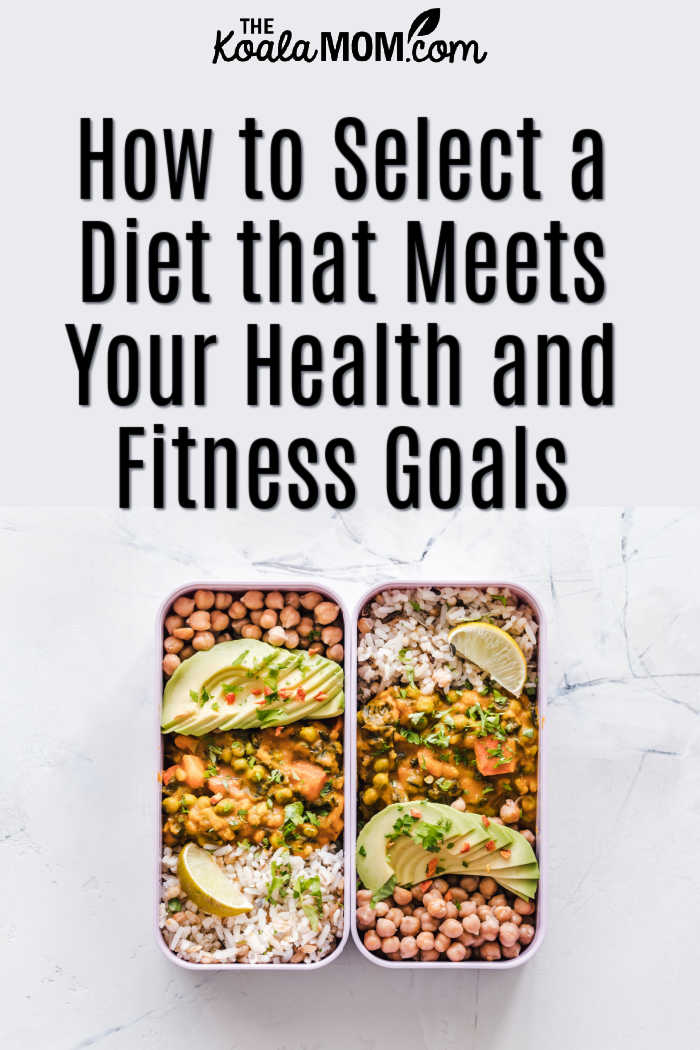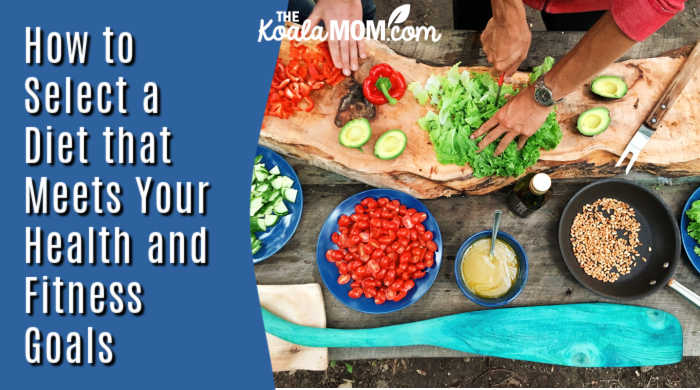When it comes to your health and fitness goals, having the proper diet is essential. Eating a balanced and healthy diet can help you stay energized, achieve your fitness goals, maintain your weight, and even improve your overall health. But with so many diets out there—from veganism to paleo to keto—how do you know which one is best for you?
This article will discuss some steps that can help guide you in selecting a diet that works best for you (and your family). With this information in hand, you should be able to make an informed decision on which type of eating plan you want to pursue to reach your desired health and fitness outcomes.

This post contains affiliate links; as an Amazon associate, I earn from qualifying purchases.
Consider your fitness goals
Do you want to build muscle, lose weight after having a baby, or just improve your overall health to thrive as a mom? Each diet has unique benefits that may be more beneficial for certain fitness goals than others.
For example, a vegan diet can help you lose weight due to its emphasis on plant-based proteins and low-calorie options, while a ketogenic diet can help you build muscle due to its higher fat content. At Dr. Berg’s website, you can see how keto works and what foods it includes, which can help you decide if this diet is the best choice for your fitness goals. In particular, you can use calculator tools to determine the number of calories and nutrients you should consume each day.
If you want to focus on overall health, look into a diet that emphasizes whole foods and minimizes processed items.
Analyze your lifestyle
Your diet should be tailored to fit the lifestyle that works best for you. If you are always on the go taking the kids to their activities and don’t have time to prepare meals or cook, then a vegan or vegetarian diet may not be practical for you since you will need to plan and buy fresh ingredients.
On the other hand, if you prefer convenience and don’t mind paying a little more for pre-made meals or snacks, then a paleo or ketogenic diet could be right up your alley since there are plenty of ready-to-eat options available.
In addition, take into account any food allergies or intolerances you may have. For those with gluten allergies, a paleo, keto, or vegan diet may be best since these diets do not include gluten-containing foods. The experts from JM Nutrition suggest working with a professional to assess individual dietary requirements and create a plan that suits your lifestyle. Personalized guidance can help ensure long-term success while avoiding potential nutrient deficiencies.
Understand your nutritional needs
Every person’s nutritional needs are different, so it is important to understand what kind of nutrients you need and in what amounts before committing to a diet. Consider factors such as age, gender, activity level, health conditions, food allergies and intolerances, and more.
For guidance, you can consult a registered dietitian who can assess your current level of health and nutrition and make recommendations regarding which type of diet is best for you. Additionally, consider using online resources such as the USDA’s MyPlate to help determine what nutrients are necessary for optimal health.
Evaluate your budget
Furthermore, it’s important to consider how much you can realistically spend on food each week. Eating healthy doesn’t have to be expensive, but it does require some financial planning.
If you’re looking for an affordable option, then a vegetarian or vegan diet may fit the bill since they rely heavily on plant-based proteins like beans, lentils, and tofu—all of which are relatively inexpensive. On the other hand, paleo and ketogenic diets may be pricier due to their reliance on meats, eggs, and nuts which can become expensive when bought in bulk.
Get feedback from experts
Lastly, it’s important to get input from professionals who specialize in nutrition or dieting. Your doctor may be able to provide helpful advice on what kind of eating plan will work best for you, or you can seek out the expertise of a registered dietitian.
They can help guide you in making an informed decision based on your fitness goals and lifestyle and can advise you on portion sizes and additional nutritional information that can help you get the most out of your diet.
Additionally, the side effects are also something to consider; some diets can cause gastrointestinal distress, fatigue, and other issues if not managed properly. However, a healthy diet can also help address gut health issues, so if you experience bloating, heartburn, and other symptoms, talk to your healthcare provider about what foods to avoid or consume in order to help heal your gut.
This is why it’s important to consult with a registered dietitian or nutritionist that can help you monitor your health and ensure that you’re getting the nutrients your body needs.

Therefore, taking into account your fitness goals, lifestyle preferences, and nutritional needs are all important factors when selecting a healthy eating plan that works best for you. With the help of an experienced nutritionist or online resources, you should now feel more confident in deciding which type of diet is most suitable for your individual needs.

No Responses Yet